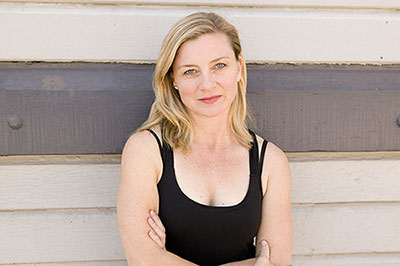Kate Champion is currently working with NIDA students on the self-devised piece, Not Who I Was, for our upcoming June production season.

Kate Champion is currently working with NIDA students on the self-devised piece, Not Who I Was, for our upcoming June production season. A creative powerhouse who founded and was at the helm of Force Majeure for 12 years, Kate is renowned for her provocative work as a director, choreographer, dancer and teacher. Here, we speak to Kate about her diverse career, her experience working with NIDA students and her advice for young artists.
Have you always loved the performing arts or was there a particular turning point in your life when you thought this is the industry for me?
I attended dance classes when I was six years old: it was an unusual dance school where there was more emphasis on creativity than pure technique. From this young age, I noticed that the people who were involved in the arts seemed the most interesting and stimulating. I didn’t have a particularly religious up-bringing and this in turn has probably meant that art has helped me most to understand aspects of our common humanity and to question notions of morality in a powerful way.
Who or what has been a major influence for you throughout your career and why?
Hmmm, this would be a very long list for many reasons. Some people influence you because you decide you don’t want to behave like them. Obviously I won’t list them!
Practically every artist I’ve worked with has influenced me in some way but so have my family and friends – even strangers. Lloyd Newson and Wendy Houston from DV8 Physical Theatre in London have had a lasting influence on my way of thinking about performance, and without doubt, but equally so, my Force Majeure Artistic Associates Roz Hervey and Geoff Cobham have continually inspired me.
What has been a career highlight for you?
Founding Force Majeure would have to be my career highlight. It’s something I’m very proud to have initiated. I never would have guessed that it could come as far as it has.
Your background is primarily in dance, what made you decide to take up this directing opportunity and work with NIDA students?
Well, our work [at Force Majeure] is dance-theatre so at least half the cast is always made up of professional actors and half the content of the show is text-based. I’ve also worked quite a bit in theatre, mainly alongside Neil Armfield who has been another major inspiration for me.
In 2012, I co-directed Food with Steve Rodgers which was a ‘play with movement’ as opposed to a dance-theatre work. When Jeff Janisheski, Head of Acting at NIDA, approached me after seeing Food to direct for NIDA, it seemed like a wonderful opportunity. I try hard not to strictly delineate art forms by categorisation.
Can you give a brief overview of what the audience can expect in Not Who I Was, your devised piece for NIDA’s June season of productions?
This is always so hard to answer when the show isn’t made yet! I hope the audience gets a window into what it means to ‘become an actor’. What really goes on behind the walls of an acting institution and what effect it has on a ‘still developing’ personality? How does this translate or compare to other forms of training and, dare I say, indoctrination? Ultimately, like with all my work, it will probably pose more questions than it answers. I think there’s a good chance it could be quite funny so we’ll see.
What has it been like working with the students?
I’ve really enjoyed working with the students and I would say if I hadn’t. I’ve worked with them each year for a two-week block since they were in their first year so it’s been fascinating to see them develop and mature. They’re enthusiastic but not blindly so. This final block will be the real test for all of us.
You have accomplished so much and have had such a positive impact on Sydney’s performing arts scene, what advice do you have for emerging creative professionals who want to be leaders in their industry like yourself?
I didn’t set out to be a leader. I was always only driven by the desire to make work, to make art, to make performance. The leader bit comes with the territory of being a director and is definitely a major part of running a company. I try and treat everybody I work with with respect. I don’t believe in the tyrannical rule of a director but I also don’t really believe in the functionality of collectives per se. I’m very clear that I’m the one who has the final say, still, I take on board all the collaborating artists suggestions and ideas as part of the process. I think that’s what makes the work rich and unique as well as being the true strength of devised-based work.
Finally, you need to be disciplined, curious, tenacious, patient, receptive and, in some way, distinctive. I guess not everyone is the leader type so it’s best you work out if that’s really something for you. There are many other effective roles in the arts besides leading – know your strengths and admit your weaknesses.

